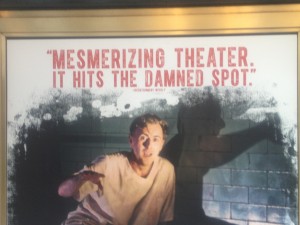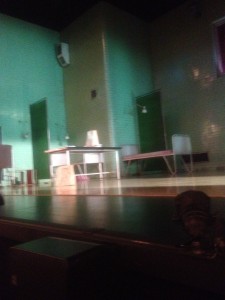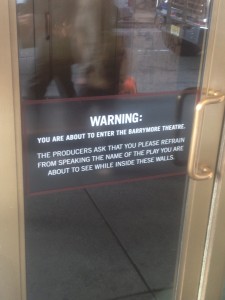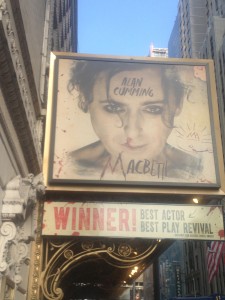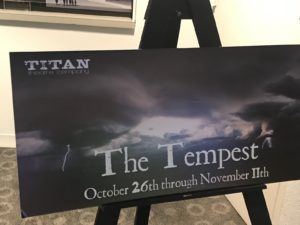 When I left the theater around 10 pm, the rain fell heavy and thick, splashing hard onto my bald head. I darted beneath trees but was pretty wet by the time I got to my car. I missed my exit for the Whitestone Bridge and had to navigate a few treacherous puddles as I made a U-turn around the LaGuardia exits. Allegories abound in wet places: was I replaying the show, or extending it, or asking for a slight variation?
When I left the theater around 10 pm, the rain fell heavy and thick, splashing hard onto my bald head. I darted beneath trees but was pretty wet by the time I got to my car. I missed my exit for the Whitestone Bridge and had to navigate a few treacherous puddles as I made a U-turn around the LaGuardia exits. Allegories abound in wet places: was I replaying the show, or extending it, or asking for a slight variation?

The Unisphere
The skies hadn’t been clear when I got to the Queens Theater a little before 7 pm to meet my students, but my Dark Sky app thought the storm might hold until midnight. I did arrive to an amazing water-show: the fountains surrounding the Unisphere, the 140′ high globe constructed for the 1964 World’s Fair in Queens, were switched on. I’d never seen them flowing before. I walked partway around the massive orb — the downwind side was torrential — and it was an amazing site. The massive sphere was dedicated in 1964 to “Man’s Achievements on a Shrinking Globe in an Expanding Universe” — which, come to think of it, makes an interesting comment on the ideological fantasies under examination in The Tempest. The jets of water shooting maybe 75 feet into the air resembled so many wet Ariels, performing the best pleasures of the wizards who built the Unisphere.
I heard a great World’s Fair story last night too: it turns out that a retired man who’s been auditing my Shakespeare classes off and on for the past few years, via a St. John’s community outreach program, had worked as a waiter in the Indonesian pavilion when he was a high school student in the summer of 1964. He described taking a motorized scooter home each night from the Fairgrounds to Forest Hills weighed down with change from tips, which would eventually overflow his sock drawer at home. He wore his marathon entrant’s cap last night, as he was getting ready to run his twenty-fifth consecutive (!) New York City marathon this Sunday.
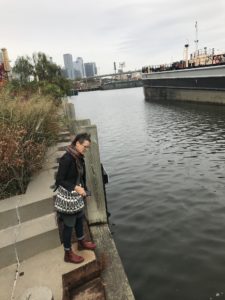
Astrida Neimanis at Whale Creek

Unisphere motto = “Man’s Achievements on a Shrinking Globe in an Expanding Universe”
The highlight of Titan Theatre’s Tempest was Devri Chism’s compellingly nonhuman Ariel. She opened the show by dancing the storm into shipwreck, and throughout the night she repeatedly controlled the audience’s attention. Perhaps her most memorable trick was a subtle practice of holding her face at an oblique angle to the other actors on stage, emphasizing the intensity and partial incomprehension of her gaze. While many of the other performances were open and accessible — I’m not sure I’ve ever seen a more innocent rendition of Miranda than Ann Flanigan’s — Chism’s Ariel was the one performance who kept us asking for just a little bit more.

About the enter the Nature Walk
I came to the stormy show after an afternoon in post-Nature, walking my favorite toxic pathway on the borderlands between Greenpoint and Long Island City on the Newtown Creek Nature Walk. I’ve not been back for a while, but all my favorites were there: the epochal steps, the sludge barge, the hidden oil mayonnaise deep below. I was lucky to have been able to convince one of my most-admired blue humanities scholars Astrida Neimanis to join me for the walk. She’s a brilliant and inspiring eco-hydro-feminist based in Sydney, Australia who I just learned a few days ago was in New York for a talk on Thursday at the Pratt Institute. I’d got the news too late to get to Pratt, but it was fantastic to finally meet her in person. We talked about Newtown Creek, about post-Nature and the sublime, about an amazing-sounding project she’d put together last summer with Cate Sandilands in Canada. It’s hard to catch up with our fellow environmental humanists who live so far away, and I felt lucky to have managed it. Plus Newtown Creek is where I want to bring all my academic friends — I actually had a plan to drag an MLA panel out to it last winter, but sub-zero temps trapped us in midtown.
Driving home through the storm, I tried to salvage Terry Layman’s Prospero. As a student suggested to me after the show, he looked right — tall, white-bearded, Gandalf-ish. He garbled some lines and stepped on enough of his fellow actors’ cues that I wondered if it was intentional, a way of signaling the bully-Dad’s desire to control his human and nonhuman children. But they played his love for Miranda conventionally, and even Caliban got forgiven in the end. I wasn’t fully convinced: Prospero is a tough part to play well in these ambivalently post-imperial and I-wish-we-could-be-post-patriarchal days. I’m still waiting for someone to hit it just right.

Steps under water at Newtown Creek
The show is up for another week, and very much worth a trip to Corona Park! Go early to walk around the World’s Fair grounds and think a little about the “Shrinking Globe in an Expanding Universe” — it’ll put you in the right mood!
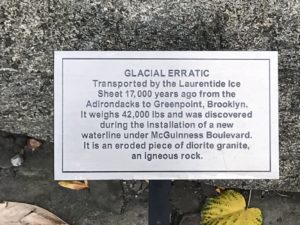
Near Newtown Creek
 Olivia and I decamped at the interval due to heat, impending murders, and in deference to her desire to see the big city after being cooped up in Stratford all week. So my thoughts of the Globe’s Othello end with 3.3, perhaps the most brutal and brilliant scene Shakespeare ever wrote, which takes the Moor from happy husband to sworn homicide. I would have liked to have seen the close, but I know how it ends!
Olivia and I decamped at the interval due to heat, impending murders, and in deference to her desire to see the big city after being cooped up in Stratford all week. So my thoughts of the Globe’s Othello end with 3.3, perhaps the most brutal and brilliant scene Shakespeare ever wrote, which takes the Moor from happy husband to sworn homicide. I would have liked to have seen the close, but I know how it ends!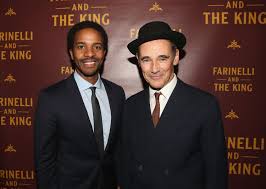
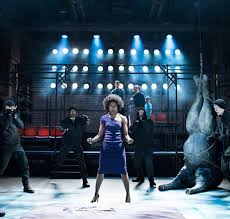

 Heading off to JFK this evening for a night on Delta’s big steel bird, but the
Heading off to JFK this evening for a night on Delta’s big steel bird, but the 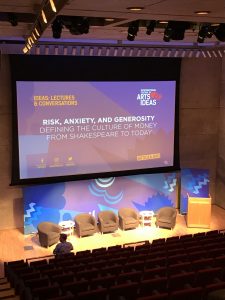
 I met Erik Blachford in fall or winter of 1985-86, when we were classmates in our first year of college. We played rugby together and were both English majors with creative interests: Erik remains an actor and theater person, and I did creative writing. But when I took a post-college academic turn, Erik headed off to Microsoft in Seattle, where he was part of the group that founded
I met Erik Blachford in fall or winter of 1985-86, when we were classmates in our first year of college. We played rugby together and were both English majors with creative interests: Erik remains an actor and theater person, and I did creative writing. But when I took a post-college academic turn, Erik headed off to Microsoft in Seattle, where he was part of the group that founded 
 I met Judy Chevalier, a professor of economics and finance at the Yale School of Management, through my son, who has been going to school with her son since both of them were little kids. It’s been a somewhat sideways way to enter into a professional conversation; I’m pretty sure that almost the entirety of the first couple years of our dialogue was about pick-up and drop-off times and each of us checking that our son had not overstayed his welcome at the other’s house. (I don’t think either ever did; I know we loved having Judy’s son with our family for part of our beach vacation last week.) Her perspective as a professor of Economics and Finance connected Shakespeare’s dramatic presentation of usury and dealmaking with longer histories of money and culture in and beyond Europe. She helped conclude our session with a brilliant exploration of why the Venetian state feels compelled to uphold the bond even when it clearly does not want to — her ringing description of the state’s role in structuring and enforcing legal contracts was one of several moments in our conversation that felt somewhat ripped from this year’s headlines.
I met Judy Chevalier, a professor of economics and finance at the Yale School of Management, through my son, who has been going to school with her son since both of them were little kids. It’s been a somewhat sideways way to enter into a professional conversation; I’m pretty sure that almost the entirety of the first couple years of our dialogue was about pick-up and drop-off times and each of us checking that our son had not overstayed his welcome at the other’s house. (I don’t think either ever did; I know we loved having Judy’s son with our family for part of our beach vacation last week.) Her perspective as a professor of Economics and Finance connected Shakespeare’s dramatic presentation of usury and dealmaking with longer histories of money and culture in and beyond Europe. She helped conclude our session with a brilliant exploration of why the Venetian state feels compelled to uphold the bond even when it clearly does not want to — her ringing description of the state’s role in structuring and enforcing legal contracts was one of several moments in our conversation that felt somewhat ripped from this year’s headlines.

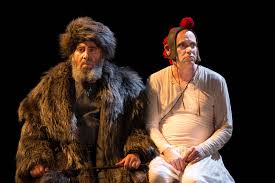
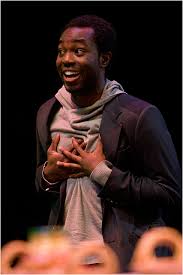
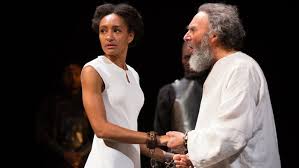


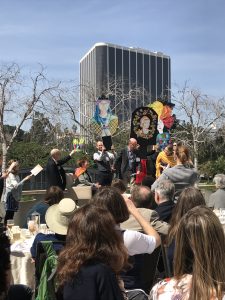

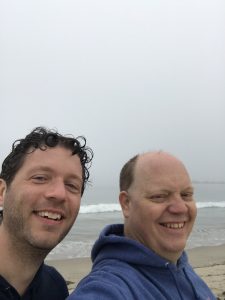
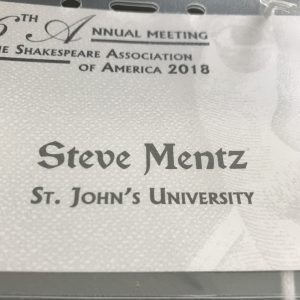 See everyone in DC!
See everyone in DC!